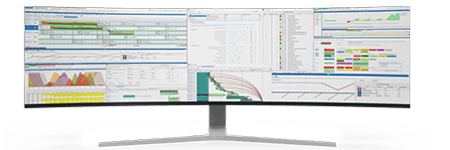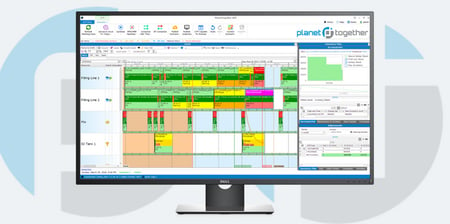Building Operational Resilience and Agility in Medical Manufacturing
Operations Directors in medical manufacturing facilities face constant challenges. These include market volatility, supply chain disruptions, regulatory changes, and an ongoing push to improve efficiencies without sacrificing product quality. These challenges underscore the need for two essential qualities: resilience and agility.
For medical manufacturing, resilience and agility aren’t just competitive advantages; they are business imperatives. An agile and resilient operation can absorb disruptions, adapt to change, and recover quickly, ensuring continuous delivery of life-saving products. Integrating advanced planning and scheduling solutions, such as PlanetTogether, with enterprise systems like SAP, Oracle, Microsoft, Kinaxis, or Aveva, is a key strategy for building a resilient and agile operation.
In this blog, we’ll discuss why operational resilience and agility matter in medical manufacturing, how an integrated solution can help achieve these qualities, and explore the role of advanced planning tools like PlanetTogether in this transformation.

The Case for Operational Resilience and Agility in Medical Manufacturing
Medical manufacturing facilities operate under unique pressures, from compliance with stringent regulations to ensuring the quality and availability of products critical to healthcare. Here are a few factors driving the need for resilience and agility in this sector:
Regulatory Compliance: Stringent regulations mean that even minor disruptions can have far-reaching effects on compliance and product integrity. Resilient systems are essential to navigate regulatory changes without compromising production quality.
Market Volatility: Demand for medical products can fluctuate significantly, as seen during global health crises. Agility in operations allows a facility to scale production up or down in response to such shifts.
Supply Chain Complexity: The globalized nature of medical manufacturing means that raw materials and components often come from various regions. Resilience in the supply chain ensures continuity, while agility allows for quick adaptations if disruptions occur.
Product Quality and Safety: Medical products must adhere to high-quality standards. Resilience is needed to maintain these standards under pressure, while agility enables timely adjustments to production processes if issues arise.
Building resilience and agility into medical manufacturing operations isn’t simple, but integrating planning and scheduling tools with existing enterprise systems makes it achievable and effective.
![]()

PlanetTogether Integration with Enterprise Systems: The Foundation for Operational Resilience
One of the most effective ways to build resilience and agility is through integrated systems. Advanced planning and scheduling (APS) tools like PlanetTogether enable organizations to plan, execute, and monitor production with precision. When integrated with ERP solutions such as SAP, Oracle, Microsoft, Kinaxis, or Aveva, these tools provide an enhanced view of the entire production ecosystem.
Key Benefits of Integration:
Enhanced Visibility Across the Supply Chain: By integrating PlanetTogether with ERP systems, Operations Directors gain a unified view of resources, materials, and demand forecasts. This integration enables proactive decision-making, ensuring the facility is prepared for potential disruptions.
Data-Driven Decision-Making: A comprehensive integration allows for real-time data exchange between systems. When PlanetTogether’s scheduling insights are combined with ERP data, decision-makers can quickly assess and act upon production issues, inventory shortages, or demand spikes.
Improved Resource Utilization: Efficient use of resources is central to operational resilience. Integrated systems allow for precise allocation of labor, equipment, and materials, enabling facilities to maximize productivity while minimizing waste and downtime.
Flexibility and Scalability: PlanetTogether’s APS capabilities, coupled with ERP data, allow medical manufacturers to pivot quickly in response to changing market conditions or unexpected disruptions. Scalability is crucial for agile operations, particularly in industries where demand can surge unexpectedly.

Key Components of Resilience and Agility Enabled by PlanetTogether Integration
1) Proactive Risk Management
Integration between PlanetTogether and ERP systems allows for real-time monitoring and analysis, essential for identifying and mitigating risks. Operations Directors can use the data insights from these integrations to proactively assess potential supply chain vulnerabilities, equipment issues, and other risk factors.
Scenario Planning: PlanetTogether enables scenario planning, allowing facilities to simulate different production scenarios. For instance, if a key supplier experiences a delay, PlanetTogether can simulate the impact on production, enabling swift adjustments. Integrating this capability with ERP systems ensures that any changes in production plans automatically update across all systems.
Predictive Maintenance: Through ERP integration, PlanetTogether can receive data on equipment performance and trigger predictive maintenance schedules. This proactive approach minimizes unexpected downtime, which is crucial for maintaining resilience.
2) Agility in Demand-Driven Production
Medical manufacturing is often demand-driven, requiring quick shifts in production schedules. Integrated systems allow operations teams to quickly adjust production levels in response to demand signals, reducing lead times and maintaining efficiency.
Real-Time Demand Fulfillment: With real-time integration, PlanetTogether can adjust production schedules based on demand fluctuations. When ERP systems detect a surge in demand, PlanetTogether’s scheduling tools can quickly align resources to meet this demand, enabling agile and responsive production.
Optimized Inventory Management: PlanetTogether’s APS capabilities support just-in-time inventory management. Integrated ERP data on inventory levels enables a balance between maintaining sufficient stock and reducing excess. This agility in inventory management ensures continuous production without overstocking, which is critical in managing costs and waste.
3) Streamlined Compliance and Quality Assurance
Maintaining compliance with regulatory standards is essential in medical manufacturing. Integrated systems simplify compliance by automating processes, tracking quality metrics, and ensuring accurate documentation.
Quality Control Monitoring: PlanetTogether can synchronize quality control processes with ERP systems. If quality control data indicates deviations, PlanetTogether can adjust production schedules to address quality concerns promptly, reducing the risk of regulatory non-compliance.
Automated Documentation and Reporting: With integrated systems, compliance reporting becomes automated. PlanetTogether’s planning tools, in conjunction with ERP data, ensure that all production steps are documented and aligned with regulatory requirements, enabling streamlined audits and inspections.
4) Enhanced Collaboration and Communication
Effective communication across departments is essential for operational resilience. Integrated systems foster collaboration by providing a single source of truth for production data, enabling faster, coordinated responses to disruptions.
Unified Dashboards and Reporting: Integration between PlanetTogether and ERP solutions consolidates data into unified dashboards, allowing teams across the facility to access real-time information. This shared visibility fosters collaboration and enables quick responses to emerging challenges.
Coordination Across Facilities: For organizations with multiple manufacturing sites, PlanetTogether’s integration with ERP systems enables synchronization across locations. This allows for resource sharing, contingency planning, and consistency in production processes across all sites.

The Competitive Edge of Integrated Resilience and Agility
In an industry where every minute counts, and the quality of products directly impacts lives, resilience and agility are non-negotiable for Operations Directors in medical manufacturing. Integrating PlanetTogether with ERP systems like SAP, Oracle, Microsoft, Kinaxis, or Aveva provides the foundation for resilient and agile operations.
By enhancing visibility, enabling proactive decision-making, optimizing resource use, and supporting compliance, this integration allows medical manufacturing facilities to navigate challenges effectively. An investment in this type of integrated planning infrastructure is an investment in operational stability, quality, and long-term success. As the medical manufacturing landscape continues to evolve, those who build resilience and agility into their operations will be best positioned to thrive.
By focusing on building resilience and agility through integrated systems, Operations Directors in medical manufacturing can better manage today’s complexities and prepare for the unknowns of tomorrow. Integrating PlanetTogether with enterprise solutions is a powerful strategy to ensure that your operations are ready for whatever challenges come your way.
Are you ready to take your manufacturing operations to the next level? Contact us today to learn more about how PlanetTogether can help you achieve your goals and drive success in your industry.
Topics: PlanetTogether Software, Improved Resource Utilization, Integrating PlanetTogether, Data-Driven Decision-Making, Proactive Risk Management, Flexibility and Scalability, Enhanced Visibility Across the Supply Chain, Medical Manufacturing, Agility in Demand-Driven Production, Streamlined Compliance and Quality Assurance





















LEAVE A COMMENT